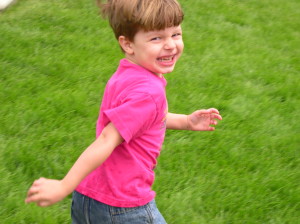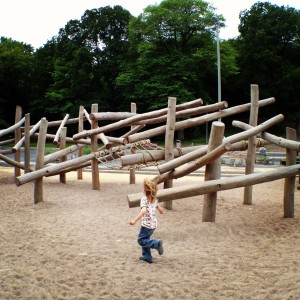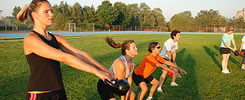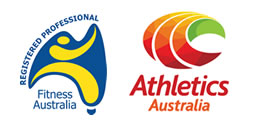Children are natural runners; they run, jump, spin hop & hurdle daily. Running forms the basis of so many games & activities for young children, and is hugely beneficial for their development, self-confidence, general health and fitness. Many parents are concerned about encouraging kids to take up running or athletics. For school aged kids the benefits are great, but here are guidelines & precautions to help your kids safely enjoy running & all of its benefits.
Always run for fun! First & foremost your children need to enjoy what they are doing. Growing up is filled with trialling new activities & tackling new experiences. If you want to encourage running, make sure it’s for the right reasons, and it’s fun.
Considerations for young runners
Pacing
Kids struggle to settle into a jogging pace, as most of their play is a sprint  & stop type of activity. Start with smaller running segments and let them set the pace… But make sure it’s not too fast!
& stop type of activity. Start with smaller running segments and let them set the pace… But make sure it’s not too fast!
Most children usually run too fast initially, possibly because they don’t have a real appreciation of just how far they have to go, or how long they’ll need to keep it up. Try to teach them pacing, but like so many of us, trial & error is a good way to learn how to pace, so they need to feel why you should run a little slower to maintain a jog for 10+ minutes.
Beware of hot days
Children don’t have a fully developed thermoregulation system, so instead of sweating as much as adults & using evaporation, kids rely on heat radiation (from those hot red faces). It isn’t anywhere near as effective & so young kids will need to take regular breaks to cool down & probably have a small drink as well.
Run barefoot as often as possible
When you’re in the park or on the beach let the kids kick off their shoes & run barefoot. If it’s safe to do so they’ll benefit from their ‘natural’ stride & help to develop strong muscles in their feet & legs.
Provide a safe environment for their training
Everything from environmental & psychological factors, their adult role models & peers will influence how they enjoy it, & whether they continue running into adulthood. Don’t push them when they’re not ready or if the weather isn’t appropriate.
Take a day off
Of course, kids aren’t always going to want to run, and parents should use common sense when deciding how hard to push their aspiring athletes. Some days they’ll just  want to stay home & play, so avoid temptation to spout your motivational mantras, instead just suggest we’ll go for a run tomorrow.
want to stay home & play, so avoid temptation to spout your motivational mantras, instead just suggest we’ll go for a run tomorrow.
Of course you shouldn’t be running every day with kids. If you are exercising with your family daily mix it up with other activities & sports such as soccer, gymnastics or dance, swimming, & general fun playtime. There are so many great activities, which all positively benefit each other. Primary school aged children should avoid the same activity repeatedly. Variety is great for physical & mental development.
Keep it fun!
Emphasise fun, fitness & family time over total distance, speed or competition. A large proportion of sport & fitness drop out is attributed to children & adolescents not enjoying sport. Whether it is because of the pressure of competition, boredom of repetitive training, or high expectations of family members some sports seem to lose kids. Keeping a fun outlook throughout their experiences is key.
Precautions for young runners
Don’t use running as punishment! Football, netball & hockey coaches are probably all guilty of it,  using the threat of ‘laps’ as a punishment to get players to do the right thing. Running should be seen as a fun activity & a chance to explore.
using the threat of ‘laps’ as a punishment to get players to do the right thing. Running should be seen as a fun activity & a chance to explore.
Help your child set realistic goals. Don’t encourage them to tackle marathon events or overwhelming tasks. Give them achievable short & med term goals, reflect on the challenges & celebrate their achievements along the way.
Make sure they know that you are proud of their efforts & not concerned whether they win or not. Running should not be about where you place, but about how you participate. That’s why personal best’s (PB’s) can be a great measure (if you need a metric). Improving your own performances over time helps build confidence show the value of hard work & training and provide a good focus regardless of how they are performing compared to their peers.
Be a positive role model for your children & show them, through your own healthy choices how great an active lifestyle is. I strongly believe the best way to encourage children into running is to set a good example yourself. They can see how good you feel after exercise & will want to emulate your efforts. Enjoy sharing it!
Other great resources include;
The Australian Dept of Health website with Physical Activity Guidelines for children
NSW government Healthy Kids
Victorian government Better Health Channel



Speak Your Mind